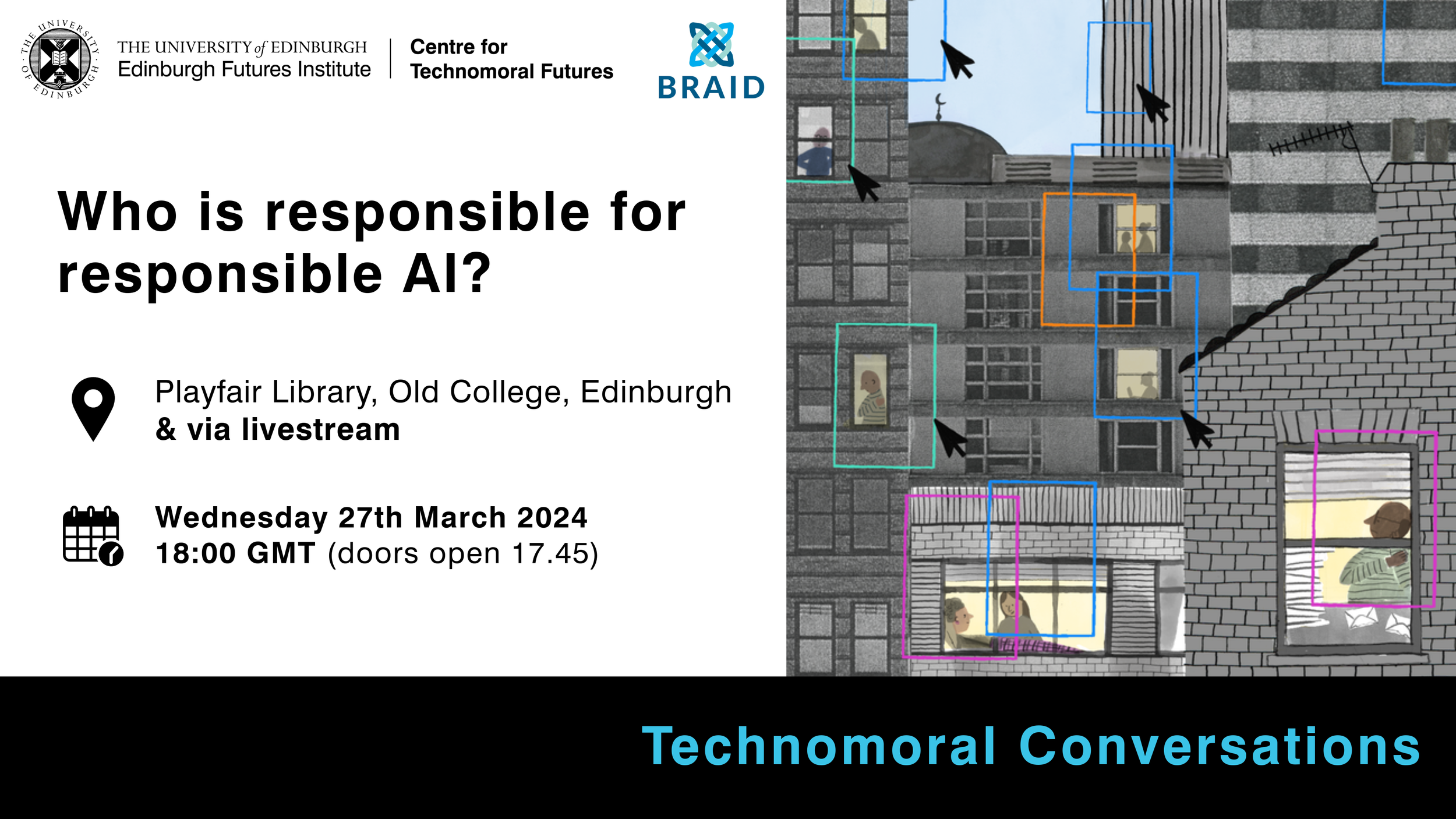About this event
The Technomoral Conversations series brings together leaders, creators and innovators from academia, technology, business and the third sector in a ‘fireside chat’ format to discuss futures that are worth wanting.
Taking inspiration from the Edinburgh Declaration on Responsibility for Responsible AI, this conversation will look at what matters most when we talk about ‘Responsible AI’ and responsibility for autonomous systems. Together, we will discuss what it will take to make the framing of Responsible AI meaningful and conducive to real change in the AI ecosystem.
During the event, there will be an opportunity to get involved in the conversation (both in person and online). Featuring Rachel Coldicutt (Careful Industries), Dr Rhianne Jones (BBC R&D, BRAID Programme), Dr Jack Stilgoe (UCL) and Steph Wright (Scottish AI Alliance), this is a conversation you won’t want to miss!
Doors open at 17.45GMT, with the Technomoral Conversation starting at 18.00GMT.
Tickets are free, but limited, so please register on Eventbrite if you would like to attend.
This event is run by the Edinburgh Futures Institute's Centre for Technomoral Futures in collaboration with the BRAID Programme and the University of Edinburgh's Science, Technology and Innovation Studies group.
Event image includes a cropped version of: Emily Rand & LOTI / Better Images of AI / AI City / CC-BY 4.0
Speaker Biographies
Professor Shannon Vallor (chair) holds the Baillie Gifford Chair in the Ethics of Data and Artificial Intelligence in the University of Edinburgh’s Department of Philosophy. She is Director of the Centre for Technomoral Futures in the Edinburgh Futures Institute, and co-Director of the UKRI BRAID (Bridging Responsible AI Divides) programme. Professor Vallor's research explores the ethical challenges and opportunities posed by new uses of data and AI, and how these technologies reshape human moral and intellectual character. She is a former AI Ethicist at Google, and advises numerous academic, government and industry bodies on the ethical design and use of AI. She is the author of Technology and the Virtues: A Philosophical Guide to a Future Worth Wanting (Oxford University Press, 2016), and The AI Mirror (Oxford University Press, 2024).
Rachel Coldicutt is a researcher and strategist specialising in the social impact of new and emerging technologies. She is founder and executive director of research consultancy Careful Industries and its sister social enterprise Promising Trouble. She was previously founding CEO of responsible technology think tank Doteveryone where she led influential and ground-breaking research into how technology is changing society and developed practical tools for responsible innovation. Prior to that, she spent almost 20 years working at the cutting edge of new technology for companies including the BBC, Microsoft, BT, and Channel 4, and was a pioneer in the digital art world. Rachel is an advisor, board member and trustee for a number of companies and charities and, from 2020-2023, served as a non-executive director at Ofcom. In 2019, Rachel was awarded an OBE in the New Year’s Honours for services for the digital society.
Steph Wright has a diverse background ranging from astrophysics to genomics in academia and film & TV to dance in the arts and the third sector. A project and programme management professional, she loves to develop and build collaborations across organisations to help people with their data/AI journey. Steph led on The Data Lab’s efforts in support of the Scottish Government in developing Scotland’s AI Strategy and she’s now leading on the delivery of the strategy’s vision for Scotland to be a leader in the development and use of trustworthy, ethical and inclusive AI as Head of Scottish AI Alliance. She is also Co-Founder of Diverse AI and was recognised as one of the 100 Brilliant Women in AI Ethics in 2023 and one of the Top 10 Women in Tech in Scotland in 2023.
Dr Jack Stilgoe is a professor in science and technology studies at University College London, where he researches the governance of emerging technologies. He is part of the UKRI Responsible AI leadership team. He was principal investigator of the ESRC Driverless Futures project (2019-2022). He worked with EPSRC and ESRC to develop a framework for responsible innovation that is now being used by the Research Councils. Among other publications, he is the author of ‘Who’s Driving Innovation?’ (2020, Palgrave) and ‘Experiment Earth: Responsible innovation in geoengineering’ (2015, Routledge). He previously worked in science and technology policy at the Royal Society and the think tank Demos. He is a fellow of the Turing Institute and a trustee of the Royal Institution.
Dr Rhianne Jones’ work focuses on ensuring emerging technology and uses of data support public service media values and a healthy media and information ecosystem. As a UKRI Future Leaders Fellow, Rhianne is establishing and leading a new research centre focused on building desirable and resilient public media futures. Prior to this Rhianne led the Responsible Innovation programme in BBC R&D where she collaborated with academic and industry partners to deliver well-timed research to inform technology, policy, and strategy. Rhianne holds a PhD in digital media and society, an MA in social research and professional qualifications in data, law, policy, and regulation, AI ethics and society, and public policy analysis. Rhianne currently leads the BBC’s engagement with the AHRC BRAID programme, the ESRC Digital Good Network and the EPSRC Centre for Digital Citizens, with which her new centre will connect. She also holds strategic advisory roles for the UK TAS Hub and Horizon Digital Economy Research Institute.
Please note this is a hybrid event.
This event will have live captioning in person and online.
Important notice: This event will be photographed/recorded, and images may be used for future marketing, promotional or archive purposes. If you would prefer not to be photographed, please let organisers know at the event.






